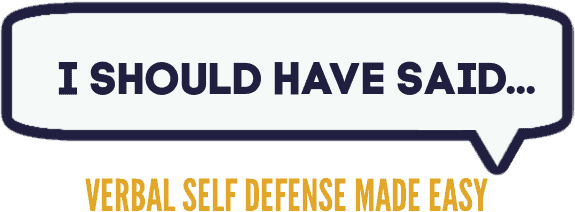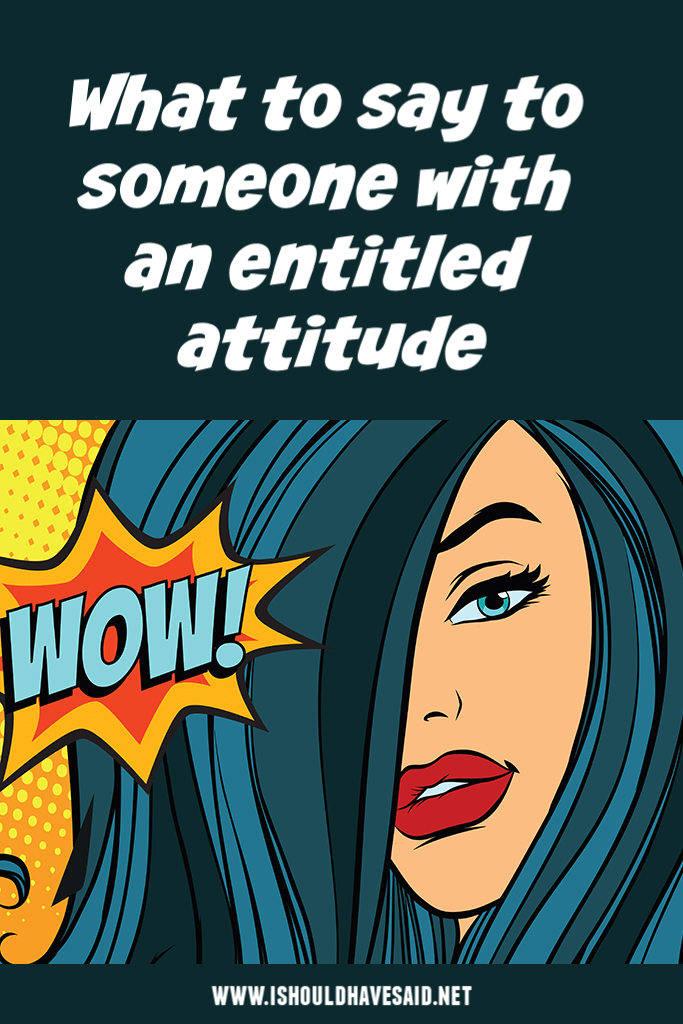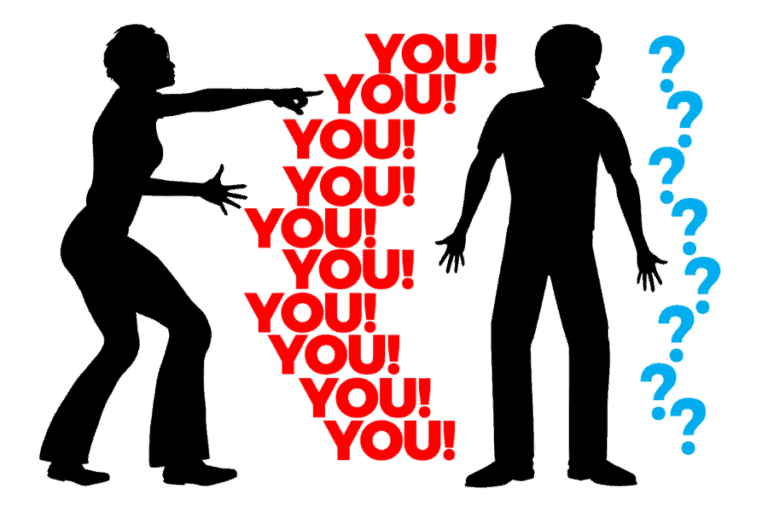
Recognizing Verbal Insults
Sometimes we can can’t tell if someone is verbally insulting us because their slights are very subtle. After spending time with the person, you may be left wondering, did they just insult me and was that actually a verbal insult? Here are some indicators to watch out for if you think someone is insulting you:
Direct Insults
Direct insults are harsh and hurtful comments designed to belittle or upset someone. They attack a person’s character, abilities, appearance, or intelligence. These remarks use negative language and a hostile tone to cause emotional harm and elicit a response from the person being targeted.
Sarcastic Remarks
Sarcastic remarks are when someone says the opposite of what they mean in a joking way, often with a mocking tone. These comments aim to be funny but can also have a hint of criticism or dislike. Understanding sarcasm depends on the situation and how it’s said, and it’s a kind of verbal irony. While some sarcasm is playful, too much or saying it at the wrong time can be unkind and confusing.
Backhanded Compliments
Although they appear pleasant at first, backhanded compliments include a hidden judgment. They tend to be a little harsh or not serious when they combine something positive with criticism. Because you must be aware of the context and tone, it might be challenging to identify them.
They may sound courteous, but they can cause the person receiving the compliment cause for discomfort or confusion regarding the speaker’s true intentions.
Understanding Non-Verbal Insults
Nonverbal insults may include eye-rolling, scoffing, contemptuous gestures, or even avoiding eye contact. These subtle signs frequently express dislike, disagreement, or rejection without the need for explicit language.

Facial Expressions
Facial expressions are the many movements and structures of the face that reflect emotions, motives, or reactions. They play an important part in nonverbal communication, helping people to convey happiness, grief, surprise, rage, and other emotions.
Below are some common facial expressions that can suggest someone is insulting you:
1. Eye rolling
2. Sneering
3. Smirking
4. Frowning
5. Raising eyebrows
Body Language
Body language may reveal details about a person’s feelings, comfort level, and conversational involvement. It speaks about the nonverbal cues and gestures that reveal details about an individual’s intentions, feelings, and ideas.
The following frequent body language clues can be used to discern whether someone is insulting you:
1. Crossing arms
2. Standing too close
3. Turning away from you
4. Avoiding eye contact
5. Leaning away from you
It’s crucial to keep in mind that non-verbal clues could have varying degrees of subjectivity and meaning. On the other hand, it could indicate that someone is attempting to offend you if you observe them constantly giving off unfavorable nonverbal clues.
MORE POSTS YOU MIGHT LIKE
- How to stand up for yourself without being rude
- Top ten comebacks for rude strangers
- More comebacks you might like
Assessing the Context
It’s critical to consider the whole context of the incident while trying to determine whether or not someone is insulting you. Here are some important things to think about:
Relationship Dynamics
Relationship dynamics are how people interact with each other in a relationship. This includes how they talk, share power, connect emotionally, and overall behave with each other. For instance, if a good friend often teases you, it might be hard to know if it’s a joke or an insult. On the other hand, if someone you’re not close to makes a comment that seems like an insult, it might be negative.
Social Settings
The surroundings or circumstances in which individuals engage and interact with one another are referred to as social settings. These environments can take many different shapes and include spaces such as offices, meeting areas, classes, parties, and Internet platforms.

For instance, it’s more probable that someone was merely trying to be humorous rather than offending you if they made a snarky remark when you were at a party. It’s possible that the person was attempting to disparage you or your job if they made the same remark in a professional context.
Cultural Differences
Cultural differences include things like language, customs, religion, and language in daily life. Using sarcasm or teasing as a kind of humor is accepted in certain cultures but may be viewed as impolite or disrespectful to others. These cultural variations should be recognized and taken into consideration while understanding the words of others.
You may tell more accurately whether someone is truly insulting you by taking these things into account and evaluating the scenario. Never forget that if you are unclear about someone’s intentions, it is crucial to get in touch with them and find out what they mean.
Responding to Insults
It can be difficult to respond to insults, but it’s usually better to remain calm and adopt a positive strategy rather than retaliating emotionally. The following are some methods for handling insults:
Staying Calm
Anger, frustration, or hurt are some of the common emotional reactions to insulting words. However, responding impulsively to insults frequently makes things worse and intensifies the argument.
When you consciously choose to maintain your composure, you allow yourself to think more clearly about the circumstances.
Addressing the Behavior
It’s important to address the conduct in response to an insult rather than the offender. This entails dealing with what the other person said or did instead of criticizing the individual. You may respond to someone who disparages your work, for instance, by saying, “I appreciate your feedback, but I worked hard on this project and I’m proud of it.” You can steer out of a personal altercation by concentrating on the conduct rather than the person.
Seeking Support
It can be beneficial to ask for assistance from others if you’re having trouble responding to an insult. This might be a trustworthy friend, relative, or coworker. You may obtain perspective and devise a better approach by discussing the issue with someone else. In addition, getting support can be a crucial first step in dealing with the problem if the insult is a component of a bigger pattern of conduct.
Keep in mind that while handling insults might be difficult, maintaining composure, confronting the behavior, and getting assistance can all help you handle the situation better.
Frequently Asked Questions:
1. How can you recognize if you’re being subtly insulted in a relationship?
If you constantly feel devalued or undermined, and you notice sarcastic remarks, backhanded compliments, or a pattern of dismissive behavior, these could be covert insults. It is critical to be attentive. Maintaining a successful relationship requires trusting your instincts and communicating openly about issues. If you constantly question the intent of words or feel consistently mistreated, it may be time to evaluate the situation and seek resolution with your partner.
2. What are the signs that someone’s insults might actually be flirtatious behavior?
It can be difficult to determine if statements are insults or flirtations, but several clues may indicate a humorous or teasing tone. Flirting may occur when the person is joking in a friendly manner, laughing, or speaking in a light-hearted tone. Playful teasing, excessive flattery, and maintaining a happy attitude are all signs.
It’s critical to consider the circumstances and ensure that all parties are at ease. Communication is essential; if you’re unclear, expressing your feelings and seeking clarity might help you determine whether the remarks are flirtatious or simply casual banter.
3. Can you give some examples of negging and how to identify it?
Negging is a manipulative method in which someone uses backhanded compliments or subtle criticisms to weaken another person’s confidence and make them more vulnerable to the manipulator’s approaches. Examples include complimenting someone and then making a negative remark, such as “You’re pretty for someone who doesn’t usually catch my eye.” If you see a pattern of praise and criticism targeted at lowering your self-esteem, it could be a red flag for negging.
4. How do you respond when someone insults you but claims they’re just joking?
If someone insults you as a joke and it bothers you, trust your feelings and speak up calmly. Let them know the remark hurt and ask for more sensitivity. You can also use humor to lighten the mood. If it keeps happening, have a serious talk about boundaries and how their words affect you. Open communication is key to a healthy relationship.
5. What is the term for giving a compliment that also serves as an insult?
Giving a compliment that also acts as an insult is referred to as a “backhanded compliment.” This type of expression appears nice on the surface but conceals a subtle or hidden offense. “You’re smarter than you look” or “You’re surprisingly good at this” are examples of backhanded compliments. Recognizing these statements is critical for understanding the intricacies of communication and maintaining healthy interactions in varied partnerships.
6. What does it signify when a guy insults you, and how should you interpret it?
In certain situations, the remarks may be an attempt at harmless teasing or flirtation, especially if they are delivered in a lighthearted tone and with good body language. However, if the insults are frequent, harsh, or make you feel uncomfortable, it may indicate disrespect or an unhealthy dynamic. Trust your instincts and talk openly. If you believe the insults are intended to undermine you or cause harm, consider sharing your feelings with the person involved.
Conclusion
In a nutshell, dealing with insults requires self-awareness, effective communication, and an understanding of others. It is critical to remain calm and assess the situation, distinguishing between friendly teasing and damaging actions. Trusting your intuition, discussing emotions freely, and creating boundaries all contribute to the development of positive relationships.
Finally, effective communication is essential for addressing concerns, clarifying intentions, and developing relationships based on respect and understanding.
The Role of counselling and self care
I Should Have Said Media will earn a commission after clicking links on this page at no additional cost to you. Learn more.
When you are dealing with a person who insults you and you find it stressful, consider getting support from a professional. Talking to a counselor is a great way to work through a challenging situation, and help you find some strategies to work through the person’s behaviour.
Better Help is a great resource where you can talk to a counselor from the comfort of your own home.
Taking care of your own needs isn’t selfish, and you will feel better in the long run.








